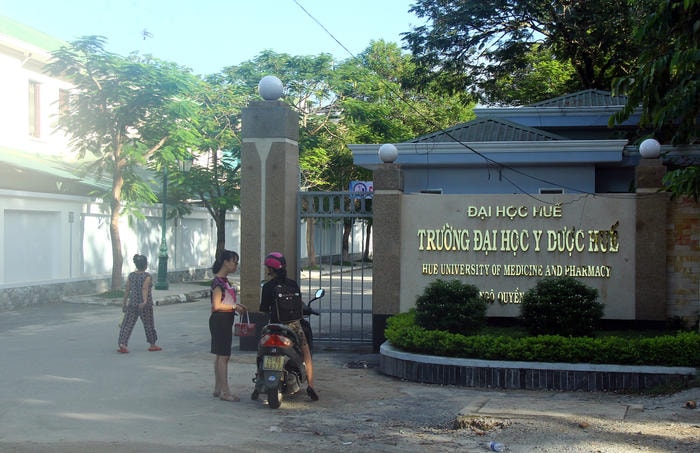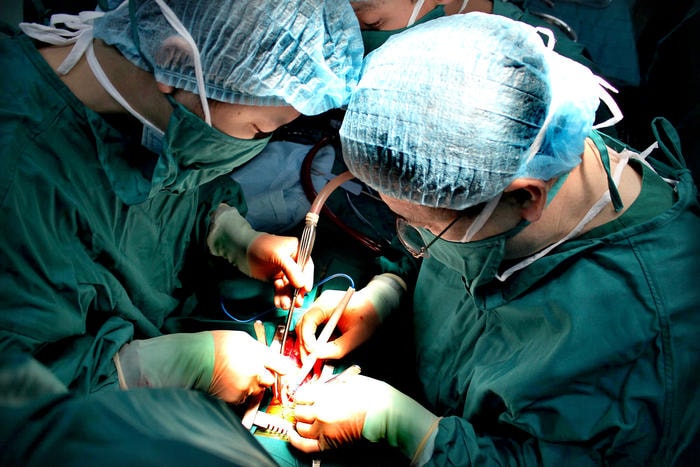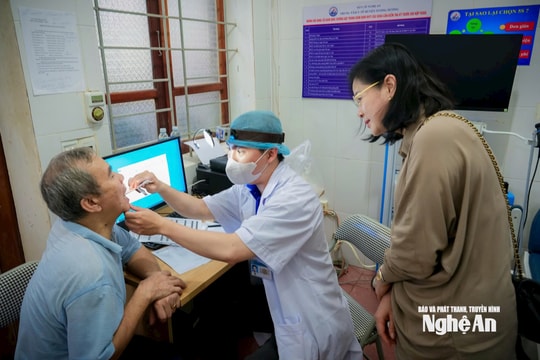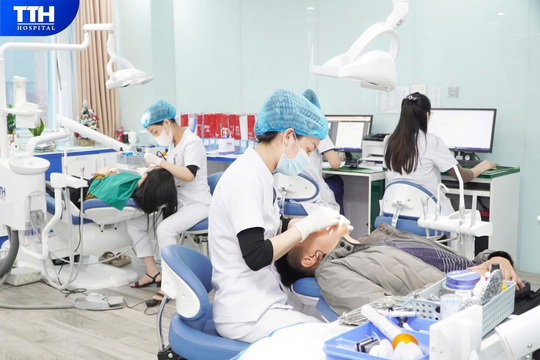'Specialized' doctors: Concerns about input quality
(Baonghean) - Also wearing a doctor's coat, there are many people who do not have to compete for each point in the university entrance exam with the entrance score always being sky-high; but there are "roundabout ways" to become a doctor such as inter-university study, recruitment or even studying according to "orders" of each locality. Although these paths often take more time to study, the quality of output is a concern.
» General Practitioner - The most difficult major in Vietnam
» To become a doctor, you will have to be a 'student' for life
Taking advantage of the weekend to visit his wife and children, before he could see his family, Mr. Nguyen L. (30 years old, from Nghe An) had to rush to catch a bus to Hue City to be on time for class. He is a final year student of the general practitioner program at Hue University of Medicine and Pharmacy.
“For more than 3 years now, I have been going back and forth like this. Now, if I try for nearly another year, I will become a doctor,” said Nguyen L. This senior student also asked to remain anonymous “for fear of affecting his job” after graduation.
 |
| Hue University of Medicine and Pharmacy is where most of the specialized doctors in the Central and Central Highlands regions are trained. Photo: Tien Hung |
Being a doctor was Nguyen L.’s dream job since he was a child. Therefore, after graduating from high school, he had only one choice: to take the entrance exam to the University of Medicine. Although he had “a lot of passion”, because his academic performance was only average, he failed the university entrance exam “5 times, 7 times”. Those times, his score was only below 20, while the general practitioner major usually requires over 27 points.
After realizing that he could not compete to get into the general medicine majors which had very high entrance scores, Nguyen L. accepted to study at the intermediate level of a medical college in Hanoi. After graduating, in order to get a job, he had to leave his family hundreds of kilometers to work at a medical station in a mountainous commune of Nghe An. After working as a medical doctor there for 3 years, he was sent to study at Hue University of Medicine and Pharmacy, only having to pass a small exam.
“For a regular medical student, even though he is a good student, he still has to work hard to study, but for a specialized student like me, it is much harder,” said Nguyen L.
To study here, he was given a small grant, not enough to cover the expenses. But as long as he got the medical license, no matter how difficult or expensive it was, he could bear it.
“After graduating, I will no longer work at that medical station but will apply to work at a district hospital. At that time, I will be able to work near my home. I know some people there,” Nguyen L. excitedly boasted. Although he was previously sent to study by his unit because this is a remote commune lacking doctors. He is also not sure, nearly a year from graduating, whether he will have enough confidence and expertise to treat difficult cases.
Nguyen L. is one of hundreds of students studying at Hue University of Medicine and Pharmacy. Among them are many doctors from Nghe An who were sent to study to serve in disadvantaged areas lacking doctors.
Prof. Dr. Vo Tam - Vice Principal of Hue University of Medicine and Pharmacy said that students of the joint training system (also known as specialized training) and the selection system are two types of medical training with "quite different" qualifications compared to the regular students studying here.
“A few years ago, there was also a training method based on the address of use, that is, according to the needs of the locality. Doctors practicing through this learning path will certainly not have high quality, because the input is lower. Before studying in the joint training program, they often took the university entrance exam and failed,” said Dr. Tam. Before Vinh Medical University and the Faculty of Medicine and Pharmacy of Da Nang University were established a few years ago, Hue University of Medicine and Pharmacy was the only place to train doctors in the Central region.
 |
| Doctor is a special profession, requiring a rigorous training environment. Photo: Tien Hung |
Considering that being a doctor is a special profession, first of all, the input quality must be high, in order to pursue the harsh training environment, according to Professor, Dr. Vo Tam, the medical industry should gradually limit this type of training.
“For the selection system, it is very difficult for many students to study. Some students study for 10 years and only graduate at the deadline. Knowing that the input quality is not high, we have to arrange for each regular class to include a few selection students to tutor them. Let them study with good students so they can progress, although the results at the end of the school year are very different,” said Professor Vo Tam, adding that currently, like many other prestigious medical schools, Hue University of Medicine and Pharmacy is gradually reducing the enrollment quota for the transfer and selection system.
Meanwhile, the director of a large hospital in Vinh City (Nghe An) said that doctors are trained through recruitment and transfer to work, but when examining and treating patients directly, many of them are confused and inexperienced.
Doctors, especially general practitioners, need to have sufficient qualities, must be well-trained, and have high output quality. The input from joint training and recruitment has largely not met this requirement" - he said, adding that the lack of human resources in remote and isolated areas is a story of all industries and professions. However, the medical industry is an industry that directly affects the lives and health of people, so quality must be put first. Currently, doctors who graduate from specialized training and recruitment mainly work at district hospitals, industry hospitals and health stations.
From 2013 to now, Nghe An Department of Health has sent 205 medical doctors to study to become doctors, mainly at commune health stations and mountainous district hospitals, and special units. "Every year, on average, the whole industry must recruit from 120 to 150 doctors to supplement the shortage. But in reality, in recent years, only about 100 doctors can be recruited each year. To supplement the shortage of doctors and meet the annual demand, medical doctors must be sent to study to become doctors at medical universities across the country, especially at the commune level and mountainous medical units," said Mr. Duong Dinh Chinh, acting Director of Nghe An Department of Health, adding that the whole province currently has more than 2,100 doctors, while the demand is up to 2,800 people.
These people are sent to study to meet local needs, but in reality there are many cases where after obtaining their degrees they request to transfer to a more convenient job.
In Nghe An, from 2015 to now, there have been 13 cases of doctors who, after being sent to study and recruited, have requested to transfer to work in other units. Of these, there were 5 cases in 2015, 4 cases in 2016 and 4 cases in 2017.
According to Mr. Duong Dinh Chinh, this is one of the things that causes difficulties for the unit, because it has created conditions and built plans to send staff for specialized training in order to serve them later, but these doctors do not return to serve the unit anymore, which also causes some impact.
In May 2017, the Prime Minister issued a series of new regulations to tighten the entrance exam in the medical industry. Accordingly, while the admission requirements for general training programs have not changed much, for the health sector, the Prime Minister has stipulated that the entrance exam will only be applied to those who have a practice certificate and the threshold for ensuring the quality of the entrance exam must be from 5 points or higher on a 10-point scale. In particular, schools will not be allowed to organize interdisciplinary training in the form of work-study for the majors of general medicine, traditional medicine, preventive medicine, dentistry, and pharmacy. As for the transfer from intermediate level to university level, candidates are required to take the entrance exam together with high school graduates in the annual university entrance exam of the higher education institution, not by taking the exam for transfer candidates as before. This means that medical doctors who want to transfer to become doctors must take the same exam as regular candidates. |
(To be continued)
Tien Hung
| RELATED NEWS |
|---|








